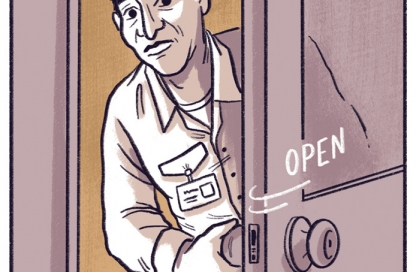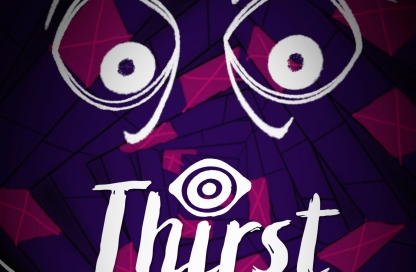Mary Georgescu’s ‘Spice of Life’ story arcade game will make you rethink AI
Welcome to the future, the very near future where robots are used in abundance but are still mistrusted and largely treated like we treat robots now.
Unit 25 just wants to be given a chance.
Help make that happen! Join us for the annual And Then… thesis show where Mary Georgescu’s game, Spice of Life will be ready for you to play. The old-style coin-op arcade cabinet perfectly complements the fascinating narrative game that has players playing through the whole thing in one sitting!
We spoke with Mary about narrative in games and how she crafted The Spice of Life.
What was the first game you played with a story that blew you away?
I think once I played Papers Please by Lucas Pope, I knew there was the possibility of creating stories with very serious tones while still being enjoyable to play and that was very exciting. The premise of the game is that you are playing as a boarder guard of glorious Arstotzka and you have 30 days to figure out a way to get your family out before its too late and they’ll close the boarders. Maybe it was the stark visual aesthetics, maybe it was the choice of music. Really it was this combination of mechanics and style that spoke to me. It addressed the issues of morality, freedom, false imprisonment, nationality, and loyalty in a way that made it accessible to see through the eyes of a morally grey character who is doing his job. That type of fictional storytelling I think directly sent me back to when my grandfather tried to escape Romania in the 1970s and the insane way he achieved that by going through armed boarders. It’s not the same situation but its the intelligent dry humor of the story, of a man who seems to be everyone’s enemy but is actually trying his best to get through the day and make his quota without getting arrested himself that makes it interesting. And the characters that come through the boarder give you an idea of how hard life is and their desperation and frustration is immediately taken out on you for the rules being different and more restrictive with each passing day.
You cannot experience this narrative without interactivity, you cannot feel the ticking until you play, you cannot understand the consequences of your actions until you begin stamping those passports and do so terribly that you have to make the hard choice of who in your family gets left behind. Is it grandma or your son? And how do you feel about yourself now, having that power to save someones life at the cost of your own.
What an intense introduction to storytelling in games! In your own personal experience, what is it about games and story that can make them such a powerful combination?
I think the player’s autonomy and power to make impactful choices in a game is what makes the narrative personal, engaging, and takes it to the next level of storytelling. What you ultimately need in a narrative is character empathy and what better way to delve into your characters life than being the character or throwing obstacles in the character’s way to see how they would overcome. You need to be able to see both the good and the bad characters go through real personal struggles in order to create a rich story where you can kind of see both sides of an argument and ultimately understand how that ending could come about. It’s exceptionally difficult to do that with a book or a film where even if events are out of order there is still a linear progression. What if I wanted to explore the environment, what if I want to avoid that final boss because I know I’m not ready and I want to live in the story a bit longer. Artistically you have so much power to craft a sandbox approach to dialogue or to events for a story that way and the options are only expanding as more developers find some mechanic they enjoy and inspire a programmer to focus on creating an additional script for that in the game engine store.
I think, much like Thomas, the ability to direct where an audio clip begins and ends is such a huge boon to the story because you are literally controlling someone’s emotions like a puppet master. There are so many games that do this well for story, Stanley Parable is endlessly entertaining and powerful. If Mary slams head into a computer monitor, just visually it gives some emotion but add the sound of clown shoes squeaking each time and suddenly it’s a different language, suddenly make it so that Mary cannot get up from the chair but can only swivel if you turn your arrow keys left and right, perpetually doomed between those two actions and then the text comes in saying “she did this to herself.”
Fascinating stuff! What do you think of the idea of games profiling you with a series of questions to gauge what kind of person you are BEFORE you play? The result could be a story that’s more custom-made for a player.
I think that depends on how you do it and what the UI looks like, I don’t think that’s necessary. Some games already have questions within the dialogue that direct you towards one kind of ending, that directly addresses what kind of person you are, without being an intrusive pop quiz.
Some games remember the terrible things you’ve done in the 1st story line and then proceed on the story line of you are a terrible person. In the sandbox approach, you can do whatever you want to within the story world and still be able to progress forward in your own unique way and at your own pace. In other words, you can go steal someone’s coin purse in between missions or take a minute to stare into the beautiful sunrise or sunset, or sing Umbrella to yourself while your character is standing in the rain.
I’m very interested in actually using more of these memory features in future games so if my character, say, kills someone maybe people will be less likely to talk to talk to you, taking the story onto another path.
The more autonomy over the story you provide, however, the higher the risk that someone might not get it or someone will just spend every waking hour singing umbrella in only one section of the world during rainstorms.
You can ask what a person’s preferences are maybe for character creation, so you feel invested in the character but so far I think the kind of profiling you are talking about makes more sense for role-playing, table top games like Dungeons and Dragons. In Dungeons and Dragons, there is a human customizing the world around your character’s story and pushes the players on individual character journeys.
Great point. As the storyteller, what was the biggest narrative challenge in your thesis, Spice of Life?
The greatest narrative challenge was pacing because of the very specific medium that I chose. I not only said, let’s make a narrative game, I said let’s make a narrative arcade game, which means people will not expect to have to sit there for a while to play to get the full story. …. Or so I was told… this myth is totally busted because I have watched people linger on for minutes past that but I’m still glad I made significant cuts.
Originally, I had the game paced out between 10 days with a lot fewer customers. As the story began to solidify I realized these conversations are taking forever in-between cooking sessions. And maybe 10 days is more like a home computer pace where you can stay at home for as long as it takes to finish the game.
Now we are at 5 playable days and much shorter conversations than I started with. The back and forth between Unit 25 and the customers was cut down to at least 3 lines of dialogue before moving on if the character was not as important. Who specifically was important and needed those precious seconds of gameplay was also part of the pacing difficulty because I wanted so much of the world building outside of the restaurant environment to come through from the dialogue.
Do you feel the narrative game has resonated with people in a way you expected, or have there been some surprises?
I don’t know why my biggest surprise is the sheer enjoyment people have when engaging the cabinet because that was my intention. Of course, it was fun for me to create the cabinet but until I started seeing people actually engage with Unit 25 I still thought there was a chance this was maybe too niche. It actually attracted a much younger audience than I originally anticipated and it’s nice to see how long people are willing to stay when I really anticipated that maybe someone wouldn’t play all 5 days but at least play through 1 dialogue scene and get a taste of the character, at the very least. But it’s exceeding expectation.
It’s hard having such a long intro, I see people getting frustrated but that just comes with the nature of what it is, it’s not what you would expect.
In a good way. I really enjoyed the game. Thanks for talking to us, Mary!


